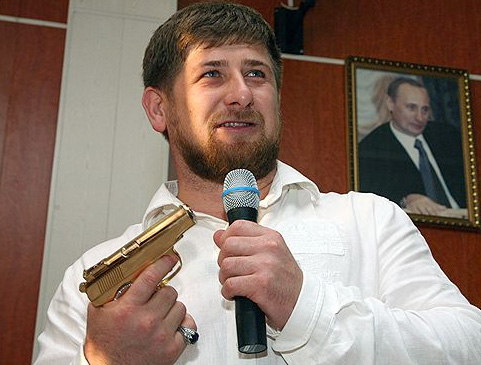
European Reports Paint Grim Picture of Kadyrov’s Chechnya
Publication: Eurasia Daily Monitor Volume: 7 Issue: 193
By:

On October 19, the European Parliament began to discuss a joint motion for a resolution on the situation in the North Caucasus. The deputies expressed their concern about the unabated violence and human rights abuses by government forces in the region. The Europeans stressed the absence of rule of law and security in the region –noting among other things, for instance, that there are a growing number of vanished residents of the North Caucasus republics who have apparently been abducted in other Russian regions. The European Parliament was also struck by the continuation of violent attacks in Chechnya, such as the recent attack on the Chechen parliament building in Grozny on October 19 (www.europarl.europa.eu, October 19). The parliament was brazenly attacked by four insurgents and three people, including two policemen, died in the attack while 17 others were injured. It took Chechen government forces more than an hour to suppress the intruders, two of whom were deemed to be suicide bombers (RIA Novosti, October 21).
Ramzan Kadyrov’s autocratic rule in Chechnya was until recently seen by the Kremlin –and, to some extent, even by many independent observers– as “the lesser of evils.” Bearing in mind the two devastating wars and massive breaches of human rights this republic experienced, the Kremlin’s bet on Kadyrov seems to have paid off. However, the latest attacks –on the Chechen parliament and a raid by insurgents in late August on Kadyrov’s home village of Tsentoroi (aka Khosi-Yurt) –exposed Kadyrov’s vulnerability and deceptiveness of the quietude in Chechnya.
In June 2010, Britain’s All-Party Parliamentary Human Rights Group led by the well-known expert on Chechnya, Lord Frank Judd, and the MP, Jo Swinson, published a harsh assessment of Kadyrov’s Chechnya based on their fact-finding mission to the republic in February 2010 (https://www.eng.kavkaz-uzel.ru/articles/13831/). For the first time in many years, they warned that the poor security situation in Chechnya was not simply an internal Russian affair, but something that should concern the international community. In particular, the reputable delegation reached an important and far-reaching conclusion, stating: “The international community’s reluctance to get involved already explains, at least in part, why a secular separatist conflict has mutated into a pan-regional radical Islamic struggle. With no one else willing to talk to Chechens, let alone stand up for them, it is not surprising that many of them are tempted by virtually the only alternative on offer, religious fanatics” (https://ehracmos.memo.ru/files/PHRG%20Chechnya%20Mission%20Report%20JUNE%202010.pdf).
The Lord Judd/MP Swinson report highlighted the profound climate of impunity in the North Caucasus. The delegates’ conclusion was that the ordinary Chechen had no recourse to any mechanism, whether political or judicial, to hold President Kadyrov’s administration to account. “The result of the current judicial system was that there appeared to be virtually blanket impunity for Federal and Chechen security officials,” the report stated, adding “And even though victims and their families were able to take their cases to the European Court of Human Rights, ECHR judgments had so far not resulted in a single prosecution of an individual for serious human rights violations within Chechnya or Russia.”
According to the mission’s assessment, there was a certain window of opportunity for the international community to convince the Russian government to rein in Kadyrov, as there was growing concern even among officials in Moscow about the enforced Islamization and covert separatist trends that Kadyrov’s regime displayed. Even more importantly, Moscow realized it was dependent on Kadyrov’s behavior and was ready to take steps to amend this situation. The report argued that the unresolved conflict in Chechnya had spread across the North Caucasus –initially to Ingushetia and Dagestan, but now also to Kabardino-Balkaria.
Even the most successful part of Ramzan Kadyrov’s rule in Chechnya –the rapid reconstruction of the ravaged republic– may have a darker side. The British parliamentary delegation referred to some of its interlocutors as saying that too much of the reconstruction funds were spent on the elite in Chechnya, while unemployment was rampant and ordinary people had few opportunities. As an example of such contrasts, the delegates visited the big apartment complex being built near the “Heart of Chechnya” Mosque that included a helipad on the top of one of the towers. Besides, state officials allegedly were in the habit of expropriating lucrative pieces of land from ordinary people.
The members of the delegation heard allegations that “during counter-terrorism operations, relatives of suspected rebels were often detained, until the end of the operation, or then even tortured and/or disappeared,” and that rebel suspects’ houses were routinely burned down by the government. They noted that “President Kadyrov and his officials were actively encouraging such action to be taken, with public pronouncements that not only Wahhabis should be destroyed, but their relatives also.”
The largely bleak picture of the modern Chechnya, despite its outward appearance of prosperity, is complemented by a lack of information and severe limits on the operations of NGO’s. According to the British parliamentarians’ report, there was a strong divide between the “official” NGO’s and the independent ones. The “official” NGO’s could criticize only the federal government, while only independent NGO’s like the Memorial human rights center could bring up important issues even when it concerned Ramzan Kadyrov himself. The climate of fear in Chechnya forced the activities of the independent NGO groups almost “underground.”
The Lord Judd/MP Swenson’s mission noted revealing official statistics in regard to the impunity enjoyed by state agencies. In 2008, 14 cases involving the abduction of 23 persons were opened, while in 2009 the figures rose to 39 abduction cases, involving 43 persons. Civilians in Chechnya lodged about 100 complaints about security services’ actions in 2008 and 87 complaints in 2009. None of the complaints resulted in criminal prosecution, while there had been three cases of security servicemen being convicted for their crimes in 2007. The figures obliquely indicate the paradoxical trend of a growing number of rights violations and a corresponding decrease in the number of complaints by civilians and criminal prosecutions of government servicemen.
The emerging consensus is that the spread of militant Islam in the North Caucasus can be and should be tamed by addressing the real needs of the people. If the West consciously turns a blind eye to the processes, the locals are likely to rely on Islamic militancy in increasing numbers. This outcome would be not only contrary to the West’s interests, but also to a great extent contradict Russia’s own long-term well-being.




